Lexus GS350 2013 Do-it-yourself maintenance / LEXUS 2013 GS350 OWNERS MANUAL (OM30C34U)
Manufacturer: LEXUS, Model Year: 2013, Model line: GS350, Model: Lexus GS350 2013Pages: 828, PDF Size: 10.43 MB
Page 741 of 828
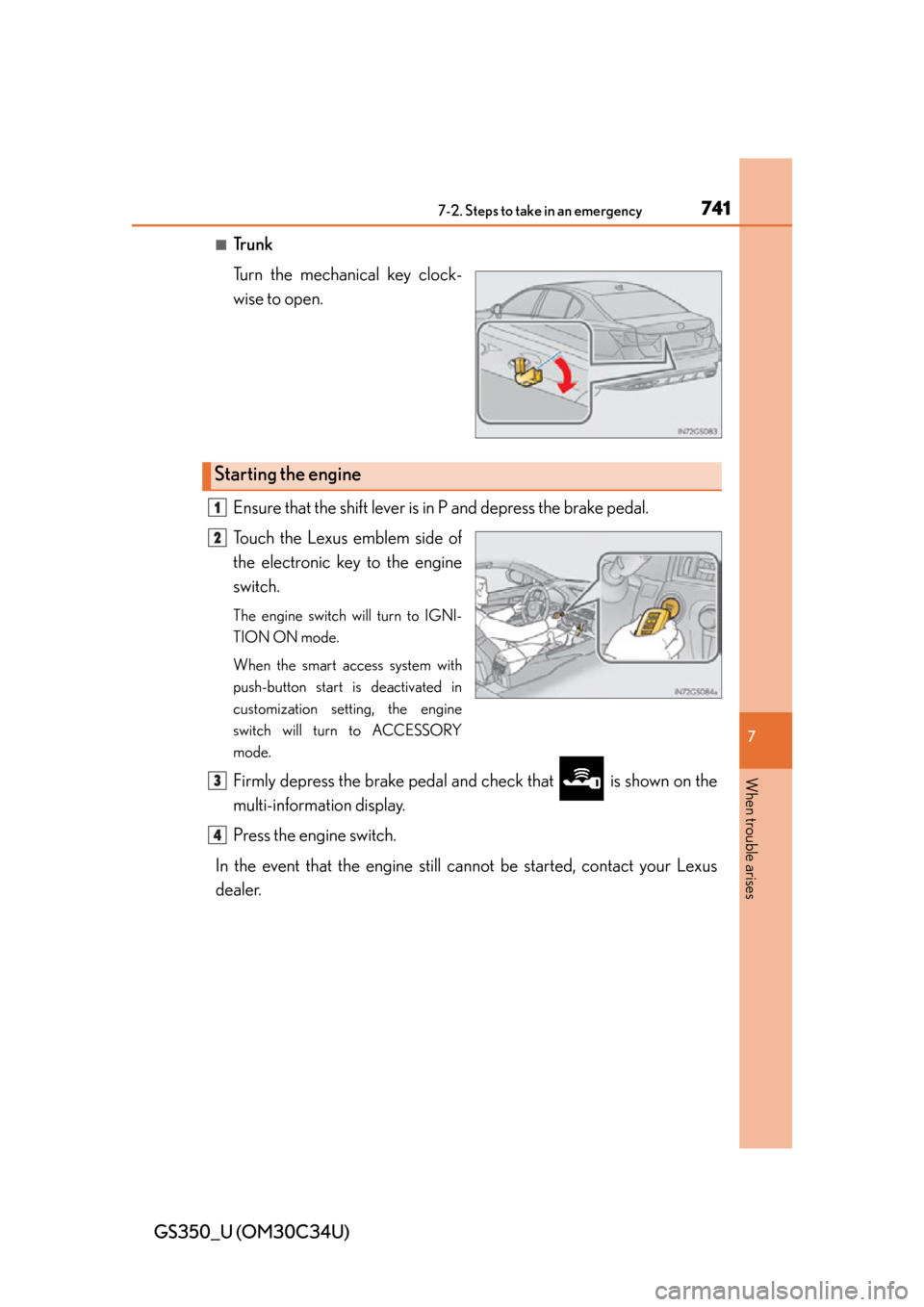
7417-2. Steps to take in an emergency
GS350_U (OM30C34U)
7
When trouble arises
■Trunk
Turn the mechanical key clock-
wise to open.
Ensure that the shift lever is in P and depress the brake pedal.
Touch the Lexus emblem side of
the electronic key to the engine
switch.
The engine switch will turn to IGNI-
TION ON mode.
When the smart access system with
push-button start is deactivated in
customization setting, the engine
switch will turn to ACCESSORY
mode.
Firmly depress the brake pedal and check that is shown on the
multi-information display.
Press the engine switch.
In the event that the engine still cannot be started, contact your Lexus
dealer.
Starting the engine
1
2
3
4
Page 742 of 828

7427-2. Steps to take in an emergency
GS350_U (OM30C34U)
■Stopping the engine
Shift the shift lever to P and press the engine switch as you normally do when stop-
ping the engine.
■Replacing the key battery
As the above procedure is a temporary measure, it is recommended that the elec-
tronic key battery be replaced immediately when the battery is depleted. ( P. 6 4 6 )
■Changing engine switch modes
Release the brake pedal and press the engine switch in step above.
The engine does not start and modes will be changed each time the switch is
pressed.( P. 1 7 2 )
■When the electronic key does not work properly
●Make sure that the smart access system with push-button start has not been deac-
tivated in the customization setting. If it is off, turn the function on.
(Customizable features P. 777)
●Check if battery-saving mode is set. If it is set, cancel the function. ( P. 1 0 7 )
3
Page 743 of 828
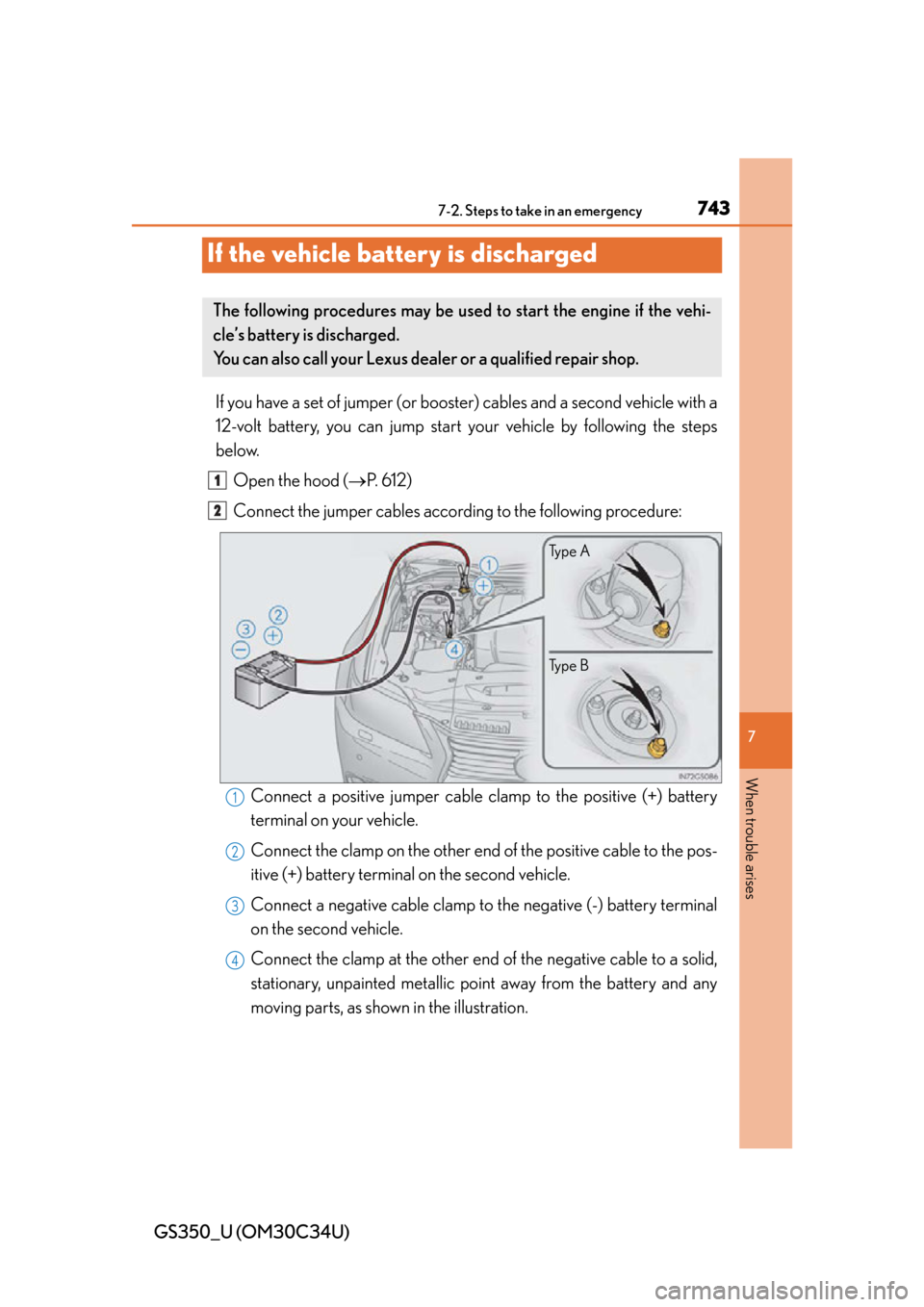
743
GS350_U (OM30C34U)
7
When trouble arises
7-2. Steps to take in an emergency
If the vehicle battery is discharged
If you have a set of jumper (or booster) cables and a second vehicle with a
12-volt battery, you can jump start your vehicle by following the steps
below.
Open the hood ( P. 6 1 2 )
Connect the jumper cables according to the following procedure:
Connect a positive jumper cable cl amp to the positive (+) battery
terminal on your vehicle.
Connect the clamp on the other end of the positive cable to the pos-
itive (+) battery terminal on the second vehicle.
Connect a negative cable clamp to the negative (-) battery terminal
on the second vehicle.
Connect the clamp at the other end of the negative cable to a solid,
stationary, unpainted metallic point away from the battery and any
moving parts, as shown in the illustration.
The following procedures may be used to start the engine if the vehi-
cle’s battery is discharged.
You can also call your Lexus dealer or a qualified repair shop.
1
2
Ty p e A
Ty p e B
1
2
3
4
Page 744 of 828

7447-2. Steps to take in an emergency
GS350_U (OM30C34U)Start the engine of the second ve
hicle. Increase the engine speed
slightly and maintain at that le vel for approximately 5 minutes to
recharge the battery of your vehicle.
Open and close any of the doors of your vehicle with the engine switch
off.
Maintain the engine speed of the seco nd vehicle and start the engine of
your vehicle by turning the engine switch to IGNITION ON mode.
Once the vehicle’s engine has started , remove the jumper cables in the
exact reverse order from wh ich they were connected.
Once the engine starts, have the vehi cle inspected at your Lexus dealer as
soon as possible.
3
4
5
6
Page 745 of 828
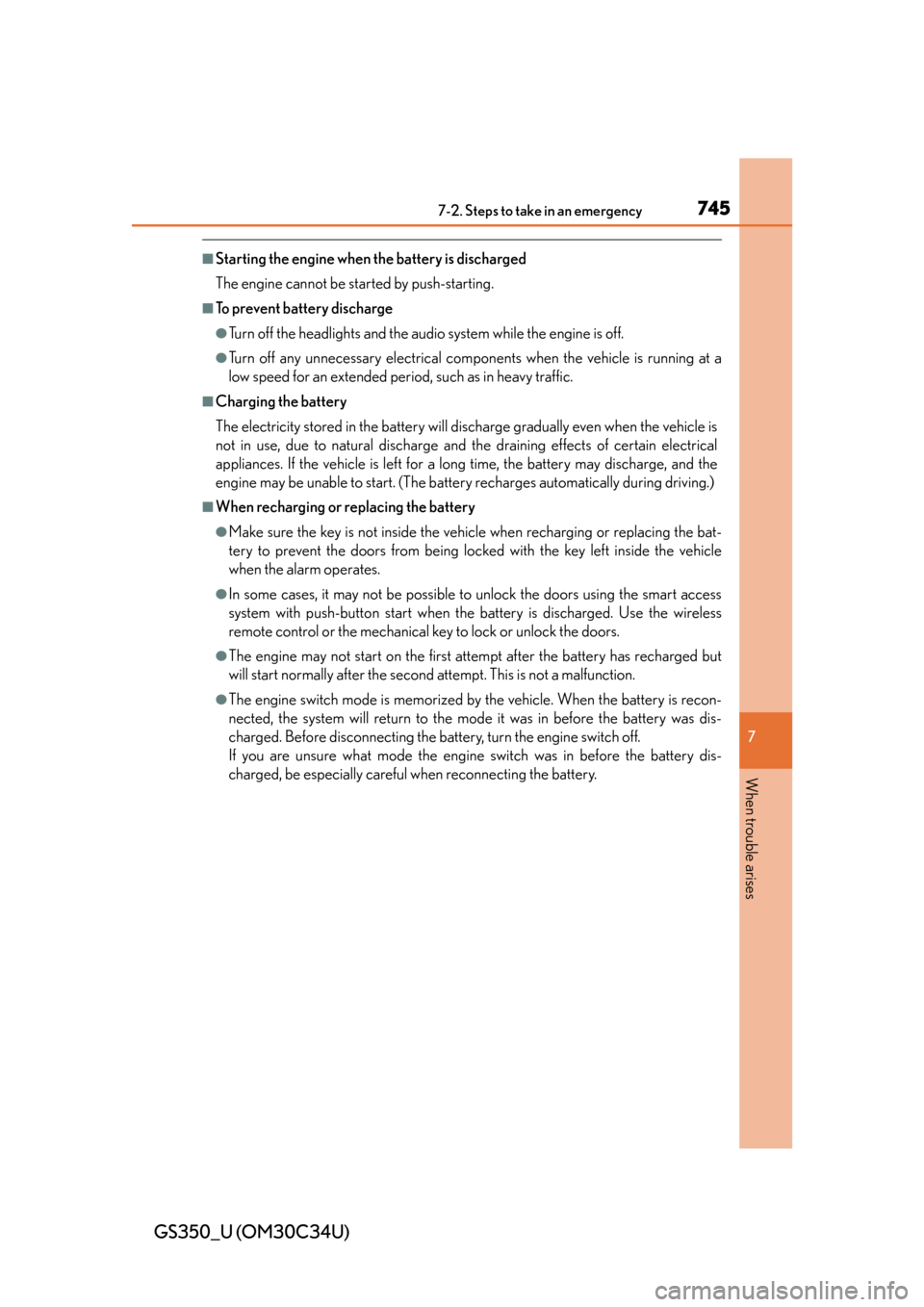
7457-2. Steps to take in an emergency
GS350_U (OM30C34U)
7
When trouble arises
■Starting the engine when the battery is discharged
The engine cannot be started by push-starting.
■To prevent battery discharge
●Turn off the headlights and the audio system while the engine is off.
●Turn off any unnecessary electrical components when the vehicle is running at a
low speed for an extended period, such as in heavy traffic.
■Charging the battery
The electricity stored in the battery will discharge gradually even when the vehicle is
not in use, due to natural discharge and the draining effects of certain electrical
appliances. If the vehicle is left for a long time, the battery may discharge, and the
engine may be unable to star t. (The battery recharges automatically during driving.)
■When recharging or replacing the battery
●Make sure the key is not inside the vehicle when recharging or replacing the bat-
tery to prevent the doors from being lock ed with the key left inside the vehicle
when the alarm operates.
●In some cases, it may not be possible to unlock the doors using the smart access
system with push-button start when the battery is discharged. Use the wireless
remote control or the mechanical key to lock or unlock the doors.
●The engine may not start on the first attempt after the battery has recharged but
will start normally after the second attempt. This is not a malfunction.
●The engine switch mode is memorized by the vehicle. When the battery is recon-
nected, the system will return to the mode it was in before the battery was dis-
charged. Before disconnecting the ba ttery, turn the engine switch off.
If you are unsure what mode the engine switch was in before the battery dis-
charged, be especially careful when reconnecting the battery.
Page 746 of 828
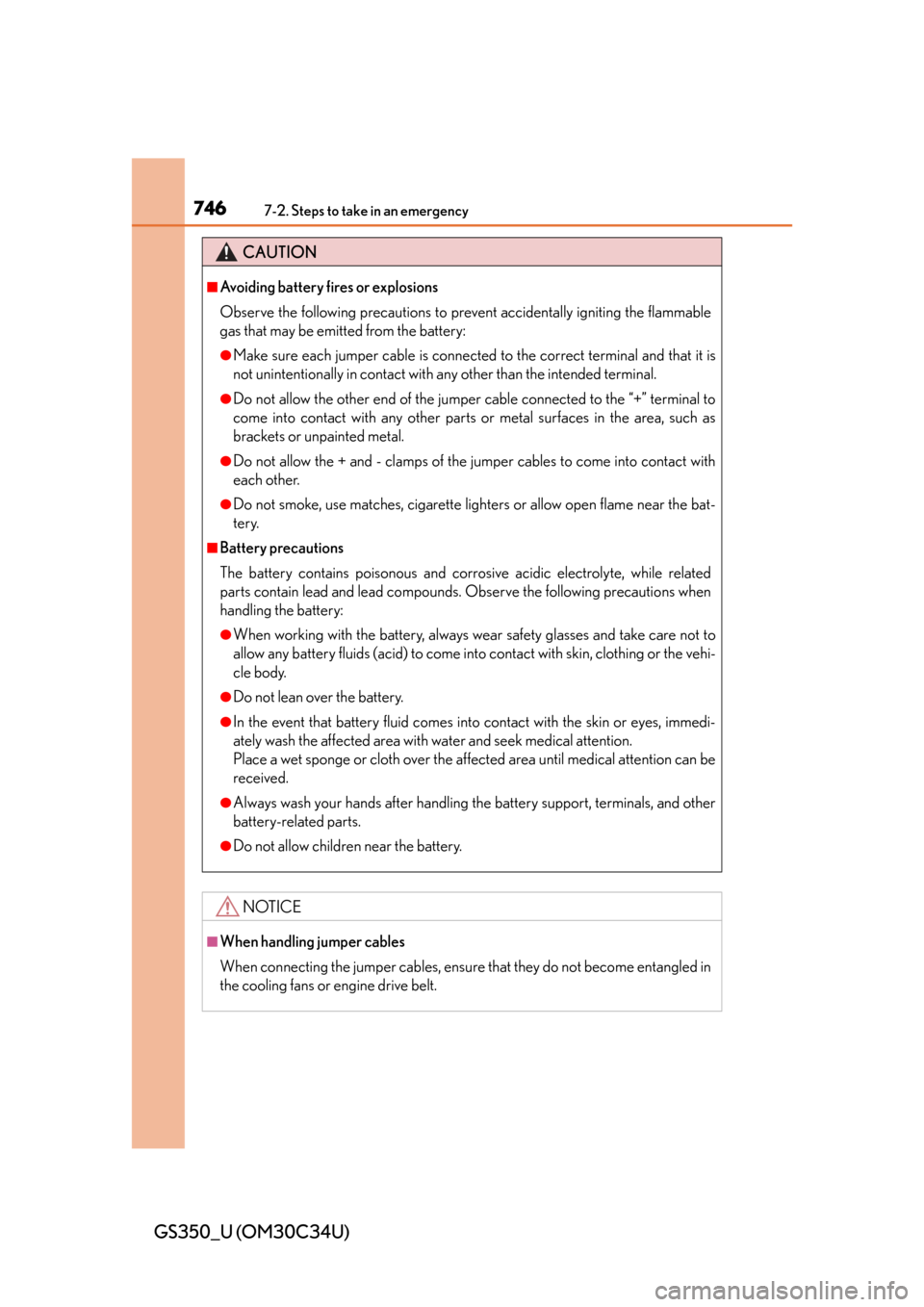
7467-2. Steps to take in an emergency
GS350_U (OM30C34U)
CAUTION
■Avoiding battery fires or explosions
Observe the following precautions to prevent accidentally igniting the flammable
gas that may be emi tted from the battery:
●Make sure each jumper cable is connected to the correct terminal and that it is
not unintentionally in contact with any other than the intended terminal.
●Do not allow the other end of the jumper cable connected to the “+” terminal to
come into contact with any other parts or metal surfaces in the area, such as
brackets or unpainted metal.
●Do not allow the + and - clamps of the jumper cables to come into contact with
each other.
●Do not smoke, use matches, cigarette lighters or allow open flame near the bat-
tery.
■Battery precautions
The battery contains poisonous and corrosive acidic electrolyte, while related
parts contain lead and lead compounds. Observe the following precautions when
handling the battery:
●When working with the battery, always wear safety glasses and take care not to
allow any battery fluids (acid) to come into contact with skin, clothing or the vehi-
cle body.
●Do not lean over the battery.
●In the event that battery fluid comes into contact with the skin or eyes, immedi-
ately wash the affected area with water and seek medical attention.
Place a wet sponge or cloth over the affected area until medical attention can be
received.
●Always wash your hands after handling th e battery support, terminals, and other
battery-related parts.
●Do not allow children near the battery.
NOTICE
■When handling jumper cables
When connecting the jumper cables, ensure that they do not become entangled in
the cooling fans or engine drive belt.
Page 747 of 828
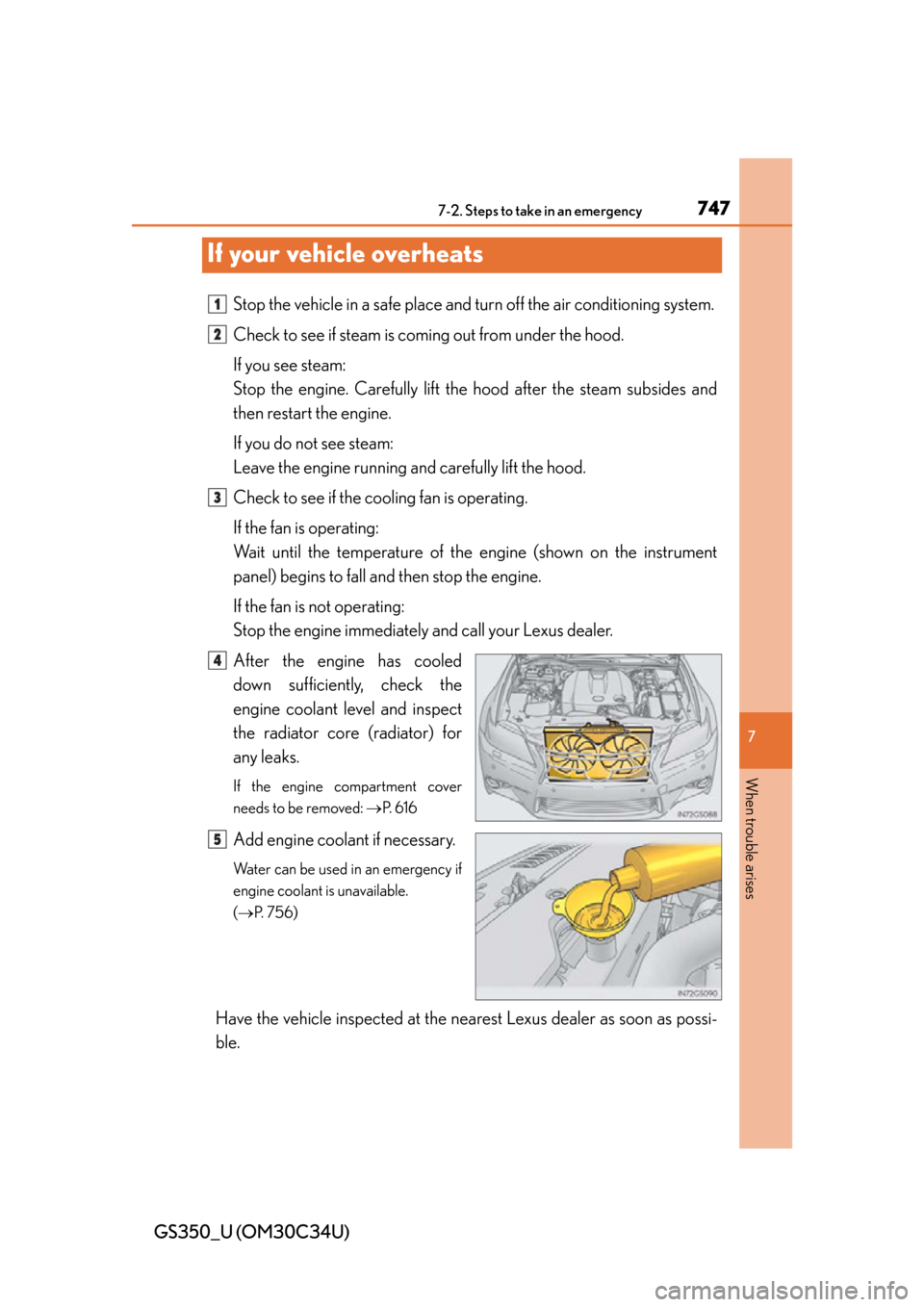
747
GS350_U (OM30C34U)
7
When trouble arises
7-2. Steps to take in an emergency
If your vehicle overheats
Stop the vehicle in a safe place an d turn off the air conditioning system.
Check to see if steam is coming out from under the hood.
If you see steam:
Stop the engine. Carefully lift the hood after the steam subsides and
then restart the engine.
If you do not see steam:
Leave the engine running and carefully lift the hood.
Check to see if the cooling fan is operating.
If the fan is operating:
Wait until the temperature of the engine (shown on the instrument
panel) begins to fall and then stop the engine.
If the fan is not operating:
Stop the engine immediately and call your Lexus dealer.
After the engine has cooled
down sufficiently, check the
engine coolant level and inspect
the radiator core (radiator) for
any leaks.
If the engine compartment cover
needs to be removed: P. 6 1 6
Add engine coolant if necessary.
Water can be used in an emergency if
engine coolant is unavailable.
( P. 7 5 6 )
Have the vehicle inspected at the near est Lexus dealer as soon as possi-
ble.
1
2
3
4
5
Page 748 of 828
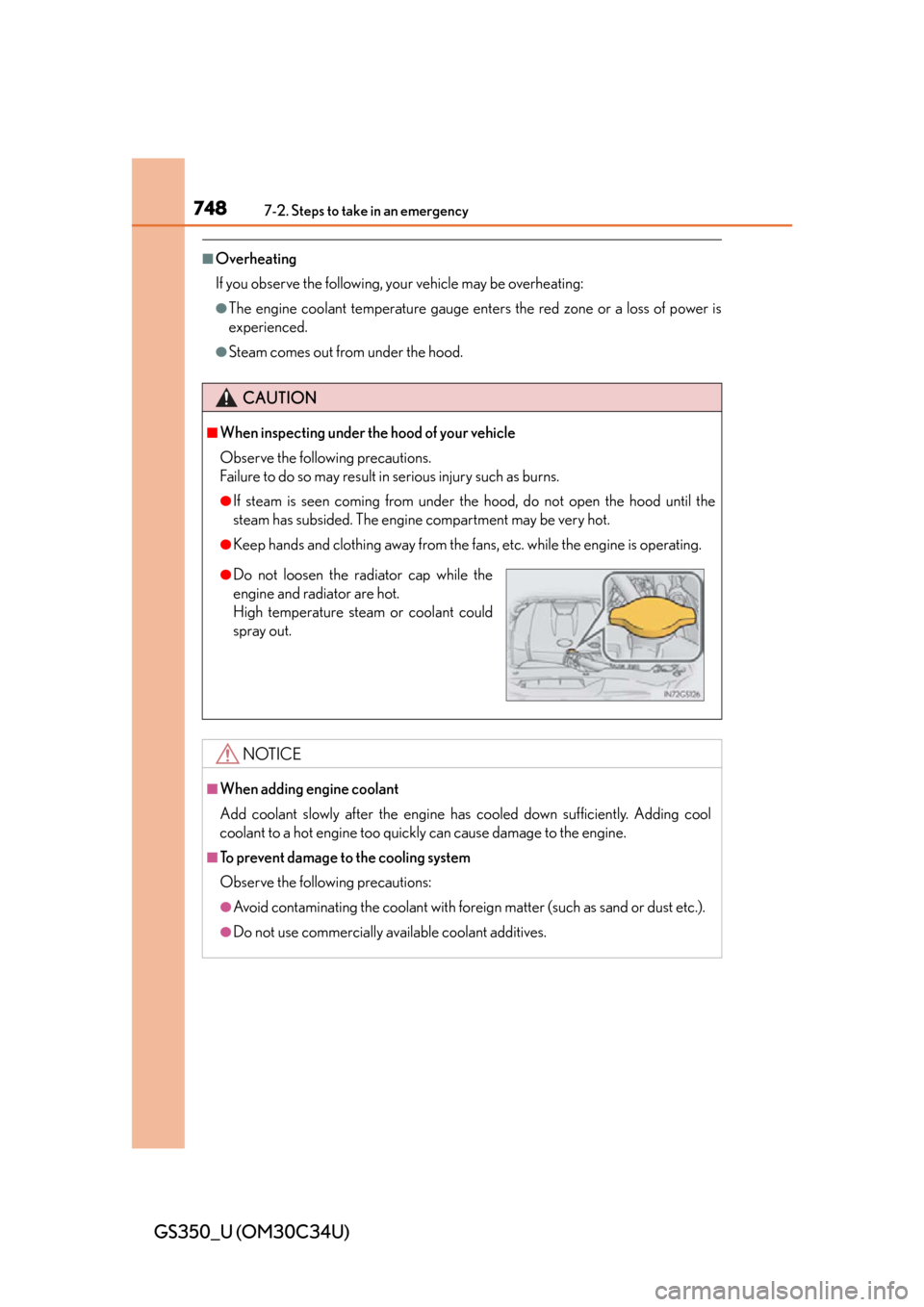
7487-2. Steps to take in an emergency
GS350_U (OM30C34U)
■Overheating
If you observe the following, your vehicle may be overheating:
●The engine coolant temperature gauge enters the red zone or a loss of power is
experienced.
●Steam comes out from under the hood.
CAUTION
■When inspecting under the hood of your vehicle
Observe the following precautions.
Failure to do so may result in serious injury such as burns.
●If steam is seen coming from under the hood, do not open the hood until the
steam has subsided. The engine compartment may be very hot.
●Keep hands and clothing away from the fa ns, etc. while the engine is operating.
NOTICE
■When adding engine coolant
Add coolant slowly after the engine has cooled down sufficiently. Adding cool
coolant to a hot engine too quickly can cause damage to the engine.
■To prevent damage to the cooling system
Observe the following precautions:
●Avoid contaminating the coolant with foreign matter (such as sand or dust etc.).
●Do not use commercially available coolant additives.
●Do not loosen the radiator cap while the
engine and radiator are hot.
High temperature steam or coolant could
spray out.
Page 749 of 828
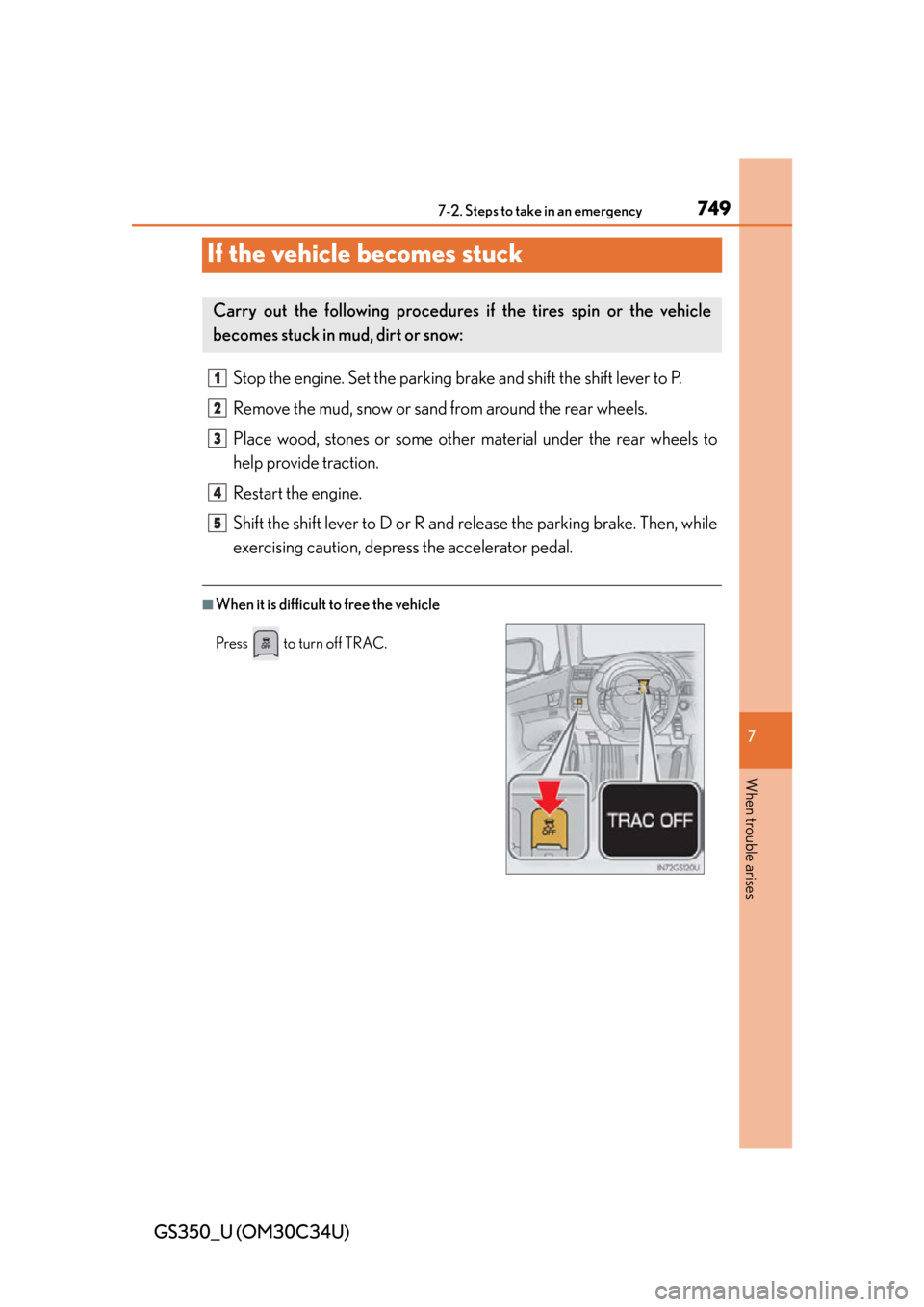
749
GS350_U (OM30C34U)
7
When trouble arises
7-2. Steps to take in an emergency
If the vehicle becomes stuck
Stop the engine. Set the parking brake and shift the shift lever to P.
Remove the mud, snow or sand from around the rear wheels.
Place wood, stones or some other material under the rear wheels to
help provide traction.
Restart the engine.
Shift the shift lever to D or R and release the parking brake. Then, while
exercising caution, depress the accelerator pedal.
■When it is difficult to free the vehicle
Carry out the following procedures if the tires spin or the vehicle
becomes stuck in mud, dirt or snow:
Press to turn off TRAC.
1
2
3
4
5
Page 750 of 828
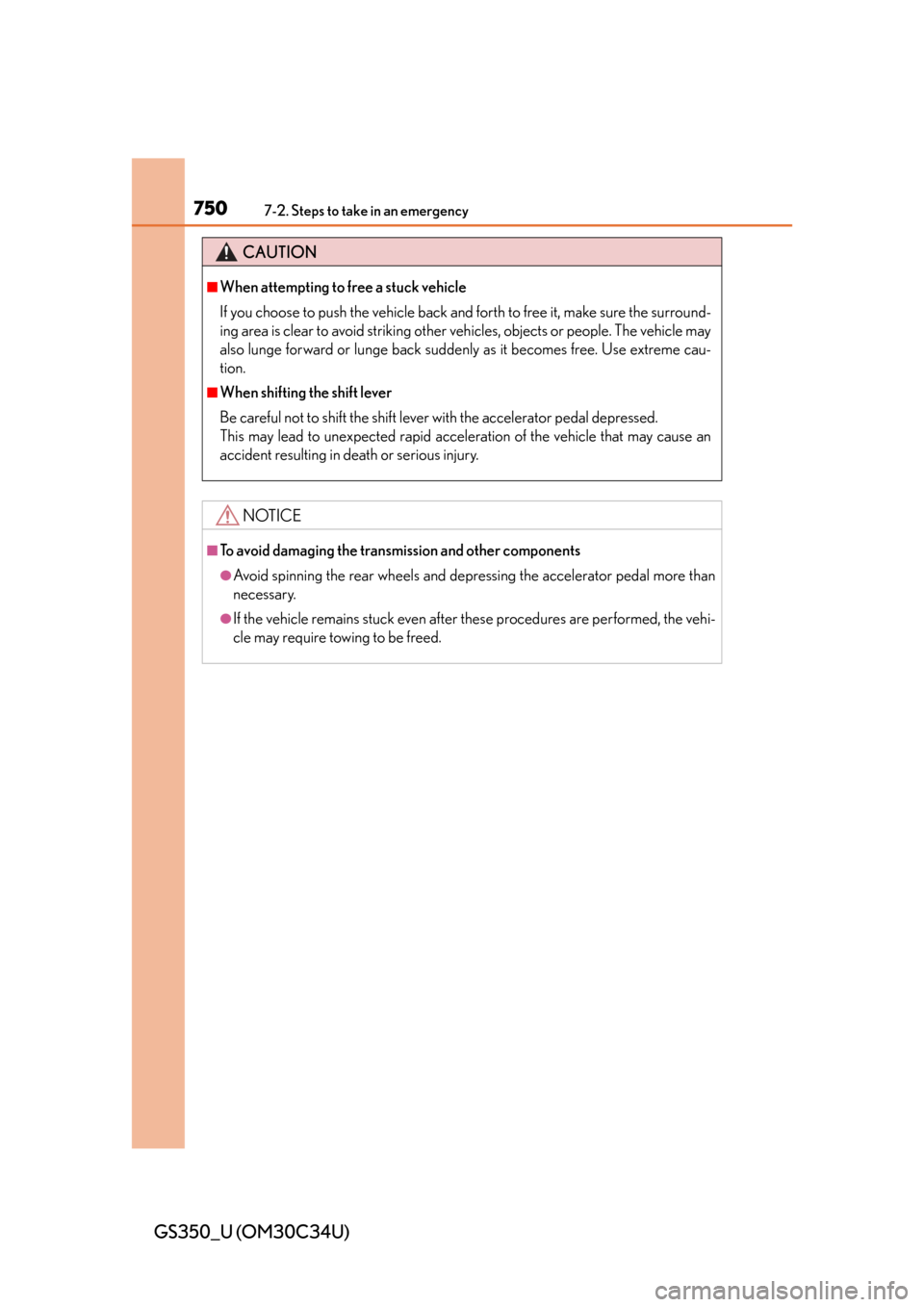
7507-2. Steps to take in an emergency
GS350_U (OM30C34U)
CAUTION
■When attempting to free a stuck vehicle
If you choose to push the vehicle back and forth to free it, make sure the surround-
ing area is clear to avoid striking other vehicles, objects or people. The vehicle may
also lunge forward or lunge back suddenly as it becomes free. Use extreme cau-
tion.
■When shifting the shift lever
Be careful not to shift the shift leve r with the accelerator pedal depressed.
This may lead to unexpected rapid acceleration of the vehicle that may cause an
accident resulting in death or serious injury.
NOTICE
■To avoid damaging the transm ission and other components
●Avoid spinning the rear wheels and depressing the accelerator pedal more than
necessary.
●If the vehicle remains stuck even after these procedures are performed, the vehi-
cle may require towing to be freed.